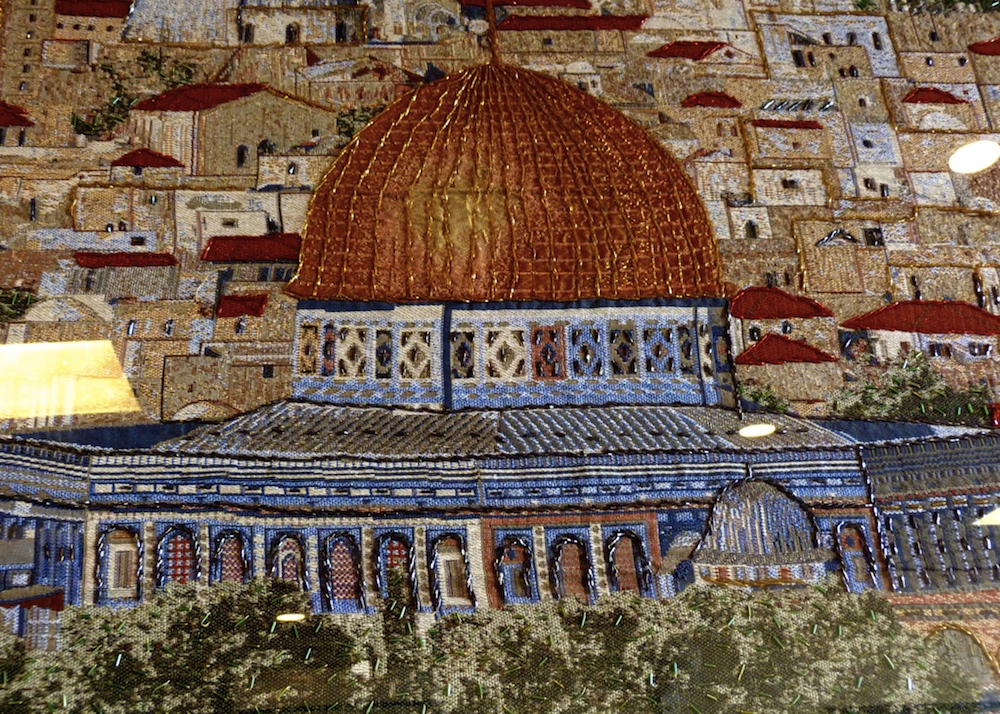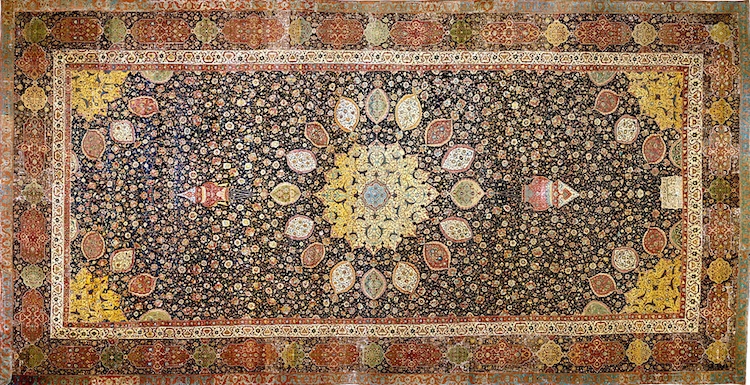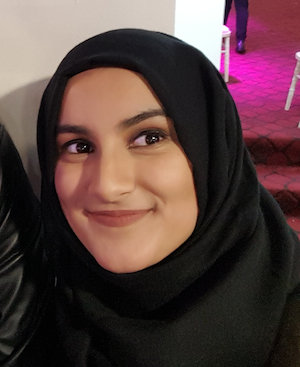Essay by Madeehah Reza
Stitching a Tapestry of Faith—from London to Mecca

Picture this: Buttercup from The Powerpuff Girls but with dark-brown eyes, wonky teeth, and two bespectacled brothers.
That was me, growing up in south London in the late 1990s. I was a child of many talents, an artist of different trades. I filled endless notebooks with grand tales and owned enough arts-and-crafts tools to shame Picasso. I turned a shoebox into a state-of-the-art kitchen for my dolls. I devoured books like air. I became a princess, a chef, and a lion all in the same afternoon. My kingdom was in the living room behind the sofa, brought alive by Barbie dolls and Polly Pocket figurines.
My parents doted on me as the only girl. I fought with my brothers, played with them, and was frequently ignored by them.
I was a tomboy. I used to moan whenever we had a wedding to attend (there were many), because I had to wear a glittering salwar kameez or lengha with itchy material. We had family in Bangladesh, and we visited them every few years, but I never looked forward to waking up with mosquito bites across my body.
Still, I grew up smelling fragrant spices, which wafted through our kitchen doorway when my mother or father cooked. I watched my parents spread out the prayer mat at five different points of the day. I remember joining my dad and brothers in maghrib, the evening prayer, my favorite part of the day. The world quieted down, and you could hear your own thoughts. I joined them without a scarf, because I was only little then, and it didn’t matter. I stood side by side with my brothers.
Over the years, I saw my dad’s beard grow bigger and grayer. I'd watch my mother tie a scarf around her hair whenever she left the house. By the time I was a young adult, I had decided to do the same.
And every Saturday in our living room, my brothers and I learned to recite from the Qur’an. Our teacher was as tall as a tree, with dark-umber skin and a laugh strong enough to lift the heaviest frown. We'd sit around the wooden coffee table on the dark-blue carpet, each with our own open copy. Mine was maroon with gold embellishments and large Arabic print. My teacher gave it to me when I was ten years old, and on that Saturday morning, I’d been overjoyed. I had a Qur’an to call my own.
• • •
That same copy still sits on my shelf in my bedroom, in that same south London suburb. The cover is frayed, the spine broken, but it represents so much about the complicated tapestry of my faith—the many threads of myself I’ve stitched together.
Faith was never something profound and philosophical for me. It wove its way through my childhood, gently shaping the way I was raised. It gave me comfort as a teenager, as I wrestled with my sense of identity. It made me realize I was different and that it’s okay to be different. It’s okay to feel like a stranger, a fish out of water. As an adult, my faith pushes me to be a better person. In my writing, it gives my words different shades of meaning.
But I remember September 2001, too, sitting in the dimly lit living room, watching the news with my brothers and mother. I was seven years old. My father came home from work, and we watched the news again. And again. The interviews repeated, journalists regurgitating the same reports from hours before. We were silent as we listened. All I knew was that something bad had happened, but no one could explain it.
I now know this something has become the background noise of my life. More than fifteen years later, non-Muslims stare at me as I walk down the street, the only brown girl with a scarf wrapped around her head. I’m still asked if I am “from this country,” even though I sound English. No matter how much I smile and try to let other people know I’m “normal,” there’s always that something at the back of my mind.
I am the other.
It’s hard to feel like a regular person when Muslims are constantly dragged onto the world’s stage, as if they’re the villains in a melodrama. Even walking into the tea room at work can turn into a discussion about how “it’s not good that all them Muslims are killing each other.” It gets tiring, trying to justify my existence as a human being.
Any mention of my faith is scrutinized, sometimes with prejudice, other times with caution. There are moments when I feel this is all I'm defined as: a Muslim. But I'm also a writer. A scientist. A daughter, a sister, a friend. I watched The Powerpuff Girls when I was a kid. I know all the words to most Disney classics. My jokes aren’t always funny, but I’ll try to make you smile, even when I feel terrible myself.
Muslims aren’t all the same. Our histories are woven from different dynasties and clans and races into a wonderfully epic tapestry—but it’s now being ripped apart in front of our eyes. Our humanity has been put through the shredder, and we are picking up the pieces.
• • •
This past September, I performed the Hajj, the annual pilgrimage to Mecca in Saudi Arabia. I left London unsure of the future, hoping this pilgrimage would help steer me in the right direction. I travelled with my parents, both of whom had been waiting years to perform the Hajj. We were eager to rekindle our spirituality, something too often ignored in everyday life. I pictured moments of quiet contemplation, serene scenes of prayer, the echo of the Qur’an played out across the city.
What I found wasn’t a tropical getaway or a serene haven. We also visited Medina, the city of the Prophet Muhammad (peace be upon him), another desert metropolis that’s grown from barren land. These chaotic cities are the complete antithesis of a quiet and drizzly London suburb, but somehow they form the beating heart of our faith.
The searing heat made my eyes burn and my legs turn weak. Rocky mountains punctuated the horizon. The shade of a flimsy umbrella was a paltry paradise. Shops and stalls lined every street; they were crammed into every dusty corner or beneath every air-conditioned hotel. There were clothes, perfume, and jewellery, souvenirs to take home to loved ones, an endless array of items for sale. I was caught in the tumultuous crowds, as thousands upon thousands entered and left Masjid al-Haram, the Sacred Mosque. I brushed shoulders with people from every tribe around the world. Someone stepped on my feet. Another barged past me.
This isn’t spirituality, I thought. How am I supposed to reconnect with God?
And yet, like clockwork, everyone in the city revolved around the invisible metronome of salah, prayer. As the days went by, the soothing ritual began to flow inside me.
Before going to Masjid al-Haram each day, I took the time to freshen up. My parents and I made sure to beat the throng to find a good spot in the mosque. We’d try to be close enough to gaze at the black-and-gold surface of the Ka’aba, the House of God, situated in the center of the mosque. I’d seen the familiar cuboid building in many pictures, but the weight of its significance settled into me when I stood before it for the first time. It became the focal point of all my prayers. As I raised my hands, I made secret pleas that I’d waited for a lifetime to whisper aloud. I prayed as a way to greet the mosque, before sitting down to listen to the adhan, the call to prayer.
That call is threaded through my life, the words in both Arabic and English, words woven through anything I know or write. These words are not a simple mantra; they are the essence of my motivation, the reason why I know I need to write:
come to prayer
come to prayer
come to success
come to success
In Mecca, this ritual was a spellbinding process, five times a day, and I never wanted to leave. At first, I was distracted by the hectic atmosphere; I felt reduced to arguments with others about jumping the queue or moaning aloud at the sheer heat. But after awhile, I pushed these things to the back of my mind and just accepted them as part of the journey.
• • •
Four thousand miles later in London, I see my old Qur’an on the shelf, frayed with much use, but always calling me back to my faith. Before I begin my daily prayers, I try to repeat the adhan myself:
come to prayer
come to prayer
come to success
come to success
Through these words, I write as a spiritual practice. Just as life flourishes in those desert cities—noisy, aggressive, and sacred—it flourishes in my writing. I use words to make sense of the nonsensical or as a way to channel what hurts into something meaningful. As others try to warp my identity, it’s not always easy to feel that faith is a blessing. Sometimes, I wonder if it’s a burden that must be carried with great difficulty. But it’s a stereotype, the idea that spirituality transcends our worldly needs. I believe spirituality is found in all our pursuits, worldly or otherwise.
After visiting the sacred cities, my perspective has changed. I am a flawed human being like everyone else, and my faith doesn’t negate or affirm that. It's just another part of me, along with my family and friends, my education, my hobbies. It’s part of life itself. Whether people choose to see beyond the prejudice and racism is not up to me, either; it’s their own choice, just as I choose to follow my faith. Many things in life can drag and shove me in the wrong direction, but I have to keep pulling myself back to the reason behind it all.
I have to silence the noise and look beyond—to the tapestry of faith I continue to stitch, haphazardly but constantly, my beautiful work in progress.

Art Information
- "Mecca Tapestry" © Rusty Clark—100K Photos; Creative Commons license.
- Stock photo of Ardabil Carpet; public domain.
 Madeehah Reza is a pharmacist from London, although her lifelong dream is to write endless books to entertain younger readers, particularly those who are not represented by the mainstream media. She has a handful of published stories and articles, and is working (ever so slowly) on her first novel.
Madeehah Reza is a pharmacist from London, although her lifelong dream is to write endless books to entertain younger readers, particularly those who are not represented by the mainstream media. She has a handful of published stories and articles, and is working (ever so slowly) on her first novel.
For more information, see her website Madeehah Writes or follow her on Twitter @madeehahwrites.
